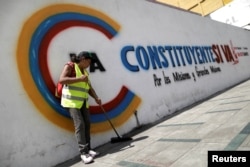Venezuelans are tensing for a national strike this week aimed at pressuring President Nicolas Maduro to cancel Sunday's controversial election of a constituent assembly to rewrite the country's constitution.
"We are calling out the entire people, all groups in society, for a 48-hour strike" scheduled to start Wednesday, legislator Simon Calzadilla said in a statement to rally opposition forces.
Calzadilla said a protest march Friday would heighten the demand that Maduro officially scrap the vote.
National holiday
In Caracas on Monday, a national holiday marked the 1783 birth of native son and Latin American independence leader Simón Bolivar. Armed government troops stood guard in clusters of three or four at schools where the polling is scheduled to take place. They watched as members of the opposition arrived to post signs advising against the vote.
Meanwhile, Venezuelans scrambled to lay in already-sparse supplies ahead of the strike. Falling oil prices and government mismanagement have led to critical shortages of food, medicine and other basic goods in what once was Latin America's wealthiest country.
In front of the Luz supermarket in the capital city's Chacao district, engineer Víctor Maglio told VOA he hoped to pick up some pasta and canned fish. But he complained that, with mostly imported products on store shelves everywhere, he could afford little else beyond that and candles.
Maglio, who is in his mid-40s, said he would "try to accumulate food" and "whatever the pocket reaches."
'An explosive week'
Delfin Miranda, a Peruvian man who has lived in Venezuela for more than 30 years, was trying to buy milk, water and nonperishables "because we do not know what's coming. Honestly, this is quite an explosive week."
It's a crucial week for Venezuela, where Maduro on Sunday threatened to imprison high court magistrates appointed last week by the National Assembly. The socialist president, in a nationally televised appearance, urged the opposition to abandon protest plans and to allow the constituent assembly vote.
"I recognize the opposition and I know that they have political strength as well. And I would like to measure force with votes, not with bullets, not with mortars, not with Molotov bombs, not with blasts," Maduro said.
He also verbally attacked U.S. President Donald Trump and several Latin American leaders for denouncing his plan to rewrite the constitution. "The imperial right wing believes it can give orders to Venezuela," Maduro said. "The only ones who give orders here are the people."
Call for foreign help
Julio Borges, president of the opposition-led National Assembly, sought foreign backing for the cause of anti-government demonstrators.
"In this crucial week, we call [upon] the international community to join Venezuela to curb fraud," Borges tweeted Sunday. He and other Maduro rivals say the president's call for the constituent assembly masks an attempt to grab power.
In an unofficial July 16 ballot organized by the opposition, some 7.5 million Venezuelans cast symbolic votes opposing the constitutional assembly and a revision of the charter.
This will be the second major strike in as many weeks. Last Thursday, anti-government protesters staged the first national strike since 2002, when a work stoppage unsuccessfully aimed to dislodge socialist leader Hugo Chavez, Maduro's predecessor.
Venezuelans, frustrated by a decline in living standards and democratic freedoms, have staged near-daily protests since early April. Clashes among Maduro foes, fans and government security forces have led to more than 100 deaths, primarily of civilians.
A warning for Americans
The U.S. Embassy in Venezuela issued a statement Monday advising Americans there to make sure they have enough water and food to last for 72 hours, to monitor news and to avoid areas where demonstrations are taking place.
Back at Luz supermarket, businessman Felipe Mellao grumbled that he often couldn't find toilet paper or toothpaste — even when he had money. He said the strike represented something larger than just a 48-hour interruption.
"The point is that there must be a drastic change, not just for two days," Mellao said. "It's for the future of our sons and daughters."





